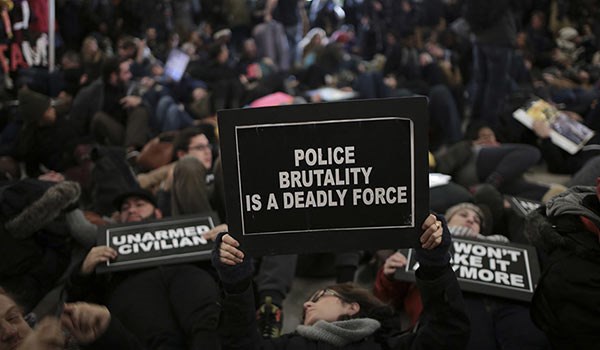
RNA - The newly-released documents are part of a larger probe into the mass surveillance exercised by the NYPD during the 2014 and 2015 protests sparked by the police killing of Eric Garner, who was choked to death at the hands of New York police Officer Daniel Pantaleo, the Guardian reported.
Just last month, New York Supreme Justice Manuel Mendez ordered the NYPD to disclose its surveillance footage of protesters from that period after a previous request for the footage was denied by the police department.
The documents reveal that the police department regularly filmed BLM activists and sent undercover officers to the protests. They were trusted enough to be included in private protest-organizing group texts.
“That text loop was definitely just for organizers, I don’t know how that got out,” Elsa Waithe, a Black Lives Matter organizer told The Guardian. “Someone had to have told someone how to get on it, probably trusting someone they had seen a few times in good faith. We clearly compromised ourselves.”
Keegan Stephan, another regular attendee of the protests in 2014 and 2015, also shared with the outlet what limited access there was to those texts.
“I feel like the undercover was somebody who was or is very much a part of the group, and has access to information we only give to people we trust,” said Stephan, who has been helping attorneys with a lawsuit to obtain the documents under freedom of information law. “If you’re walking to Grand Central with a handful of people for an action, that’s much more than just showing up to a public demonstration, that sounds like a level of friendship.”
Activists originally filed the lawsuit against the police department after it denied a freedom of information request for footage and argued that police surveillance could amount to a violation of their First Amendment rights to freedom of speech and assembly.
Joseph Giacalone, a retired NYPD detective sergeant and professor at John Jay College, also relayed how difficult it would be for even an undercover officer to join a small group of protesters.
“It would be pretty amazing that they would be able to get into the core group in such a short window of time,” said Giacalone. “This could have been going on a while before for these people to get so close to the inner circle.”
For attorneys, what’s most concerning is whether the NYPD has violated the department’s intelligence-gathering rules, known as the Handschu Guidelines.
“The documents uniformly show no crime occurring, but NYPD had undercovers inside the protests for months on end as if they were al-Qaida,” David Thompson, an attorney of Stecklow & Thompson, who helped sue for the records, told The Guardian.
Giacalone added that possible breach of official policy will be difficult for the department to defend.
“If they’re not talking about any crimes being committed, they’re going to have a difficult time defending this. It may end up in another one of these lawsuits,” he said. “Some may say this is good police work, fine, but good police work or not, we have rules against this kind of thing in New York.”
While attorneys have filed a petition asserting that the NYPD may have failed to produce all of its surveillance records, for many activists, the damage has already been done.
“In the first couple of months, we had a lot of people in and out of the group, some because they didn’t fit our style but others because of the whispers that they were undercovers,” explained Waithe. “Whether it was real or perceived, that was the most debilitating part for me, the whispers … It’s really hard to organize when you can’t trust each other.”
847/940